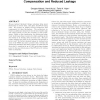Free Online Productivity Tools
i2Speak
i2Symbol
i2OCR
iTex2Img
iWeb2Print
iWeb2Shot
i2Type
iPdf2Split
iPdf2Merge
i2Bopomofo
i2Arabic
i2Style
i2Image
i2PDF
iLatex2Rtf
Sci2ools
102
click to vote
DAC
2006
ACM
2006
ACM
An adaptive FPGA architecture with process variation compensation and reduced leakage
Process induced threshold voltage variations bring about fluctuations in circuit delay, that affect the FPGA timing yield. We propose an adaptive FPGA architecture that compensates for these fluctuations. The architecture includes an additional characterizer circuit that classifies logic and routing blocks on each die according to their performance. Based on this classification, the architecture adaptively body-biases these resources by either speeding up the slow blocks or by slowing down the leaky ones. This procedure mitigates the effect of the variations and provides a better yield. We further diminish leakage by slowing down areas of the FPGA that have a positive slack. Overall, this architecture minimizes the timing variance of within-die and die-to-die Vth variations by up to 3.45X and reduces leakage power in the non-critical areas of the FPGA by 3X with no effect on frequency. Categories and Subject Descriptors B.3.1 [Integrated Circuits]: Types and Design Styles General Term...
Adaptive Fpga Architecture | DAC 2006 | Design Automation | FPGA Timing Yield | Threshold Voltage Variations |
Related Content
| Added | 13 Nov 2009 |
| Updated | 13 Nov 2009 |
| Type | Conference |
| Year | 2006 |
| Where | DAC |
| Authors | Georges Nabaa, Navid Azizi, Farid N. Najm |
Comments (0)

